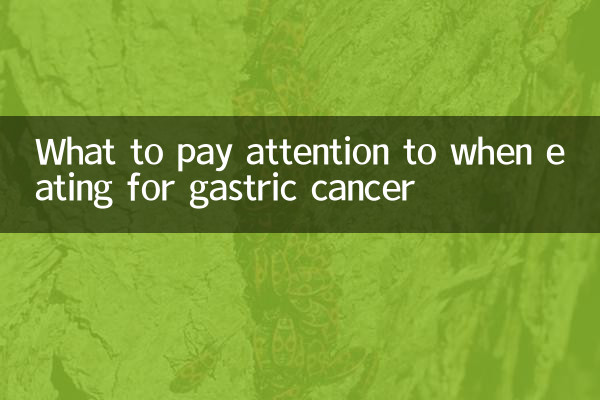What to pay attention to when eating for gastric cancer
Gastric cancer is a common malignant tumor, and dietary conditioning plays a vital role in the treatment and recovery process. A reasonable diet can not only reduce symptoms, but also improve patients' quality of life and treatment effects. The following are detailed precautions on gastric cancer diet, compiled based on hot topics and hot content in the past 10 days.
1. Basic principles of gastric cancer diet

The diet of gastric cancer patients should be light, easy to digest, and nutritionally balanced, and avoid irritating foods. The following are the basic principles of gastric cancer diet:
| principles | Specific content |
|---|---|
| Eat small meals often | Eat 5-6 times a day, small amounts each time, to reduce the burden on the stomach |
| Easy to digest | Choose soft, easy-to-digest foods, such as porridge, noodles, steamed eggs, etc. |
| High protein | Increase the intake of high-quality protein appropriately, such as fish, chicken, soy products, etc. |
| low fat | Reduce greasy food to avoid increasing the burden on digestion |
| Diversification | Ensure balanced nutrition and intake of multiple vitamins and minerals |
2. Recommended foods for gastric cancer patients
The following foods are suitable for patients with gastric cancer, as they can provide nutrients without increasing the burden on the stomach:
| food category | Recommended food | Benefits |
|---|---|---|
| Staple food | Millet porridge, oatmeal porridge, soft rice, noodles | Easy to digest, provides energy |
| protein | Fish, chicken breast, tofu, eggs | High-quality protein, repair tissue |
| Vegetables | Pumpkins, carrots, spinach, broccoli | Rich in vitamins and dietary fiber |
| Fruits | Bananas, apple puree, ripe peaches | Vitamin supplement, easy to digest |
| Others | Yogurt, lotus root starch, almond milk | Supplement probiotics and nutrients |
3. Foods that gastric cancer patients should avoid
The following foods may irritate the gastric mucosa or increase the burden of digestion and should be avoided by gastric cancer patients:
| food category | Foods to avoid | Reason |
|---|---|---|
| Spicy and exciting | Chili, mustard, pepper, garlic | Stimulate gastric mucosa and aggravate inflammation |
| greasy food | Fatty meat, fried foods, butter | Difficult to digest and increase burden |
| pickled food | Pickles, bacon, smoked fish | Contains nitrites, increased risk |
| Excellent food | Nuts, hard candies, raw vegetables | Difficult to digest and may damage stomach lining |
| alcoholic coffee | Alcohol, espresso, carbonated drinks | Stimulate gastric acid secretion and damage mucosa |
4. Dietary precautions after gastric cancer surgery
After gastric cancer surgery, the patient's digestive function will be affected to varying degrees, and the patient's diet needs special adjustments:
| postoperative period | Diet characteristics | Things to note |
|---|---|---|
| 1-3 days after surgery | fasting or little fluids | Follow the doctor’s advice and recover gradually |
| 4-7 days after surgery | All-liquid diet | Rice soup, lotus root starch, clear soup, etc. |
| 1-2 weeks after surgery | semi-liquid diet | Porridge, egg custard, rotten noodles, etc. |
| 2-4 weeks after surgery | soft food | Gradually transition to a normal diet |
| 1 month after surgery | ordinary diet | Still need to pay attention to dietary principles |
5. Answers to frequently asked questions about gastric cancer diet
According to recent popular discussions, the following are the dietary issues that gastric cancer patients are most concerned about:
1. Can patients with gastric cancer drink milk?
You can drink it in moderation, but some patients may be lactose intolerant. It is recommended to choose low lactose or fermented dairy products such as yogurt.
2. Do gastric cancer patients need nutritional supplements?
Under the guidance of a doctor, you can appropriately supplement vitamins, minerals or formulas for special medical purposes, but it is not recommended to take large amounts of health care products on your own.
3. Can patients with gastric cancer eat seafood?
You can eat fresh seafood in moderation, such as fish, shrimp, etc., but raw food and excess should be avoided.
4. How can patients with gastric cancer prevent malnutrition?
Eat small meals frequently, choose foods with high nutrient density, and use nutritional supplements under the guidance of a nutritionist when necessary.
6. Long-term management of gastric cancer diet
Dietary management for patients with gastric cancer is a long-term process that needs to be continuously adjusted according to individual conditions and treatment stages. Suggestions:
1. Regularly review your diet and adjust your diet plan according to your doctor’s recommendations
2. Keep a food diary and observe body reactions
3. Maintain communication with nutritionists and obtain professional guidance
4. Pay attention to weight changes and adjust nutritional intake in a timely manner
5. Maintain a positive attitude and combine dietary conditioning with treatment
Dietary conditioning for gastric cancer is an individualized process. Each patient's situation is different, and the most suitable dietary plan should be formulated based on his or her own situation and doctor's recommendations. Through scientific and reasonable dietary management, gastric cancer patients can be helped to better restore their health and improve their quality of life.

check the details

check the details